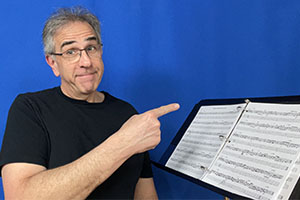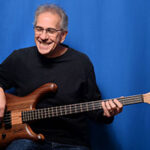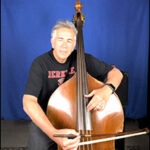If you’ve been putting it off, you need to read this
By Jon Liebman
April 29, 2022
So how’s it going with your bass playing? Are you still dabbling in learning bass? Maybe you’re doing more than just dabbling. Even better! Either way, I hope it’s going well for your and you’re finding lots of joy and fulfillment in learning bass.
Not to burst your bubble, but… how’s your sight reading coming?
It’s not my intention to take the wind out of your sails. Rather, it’s to encourage you, to inspire you to learn something new.
Can you at least read a chord chart? If so, that’s great! It’s a good start (if not, that’s okay too – hang in there). But there’s so much more you can be doing if you’re willing to put in the time.
A few weeks ago, I had a very enjoyable conversation with Tom Wakeling, a wonderful upright jazz player, published as this week’s FBPO interview. As you might expect, I asked Tom what advice he has for someone who wants to learn bass. At first he stressed the importance of listening and finding ways to take what you hear in your head and express it through your instrument. He had some great thoughts on building good bass technique too.
What he really emphasized, though, is developing the skill of reading music. “It’s tedious,” Tom says, “and it takes a long time, but if you just do it in little teeny pieces, it’s one of those things where, you do it for a month or two and you pick up a couple of little nuggets and you go, ‘Oh, that was pretty cool! I got a new thing!’ And you get excited.”
I’ve always encouraged my students to learn to read. I’ve found sight reading to be an often overlooked skill among many musicians, so I decided to sit down and list some of the benefits of learning to read.
Here are my top 5 reasons for learning to read music:
1. It’s gratifying to acquire a new skill.
Now that you’ve reached a certain point in your life, think back for a minute on some of the skills you’ve acquired over the years. Some of them may have required a lot of time and effort, but you stuck with them. No doubt you can do certain things now that not everyone can do. Then, as time went marching on, you may have settled into a routine and now find yourself just going through certain motions. When was the last time you learned to do something new? If you said learning bass, that’s great! So how about ratcheting things up and learning to read music too? Trust me, you won’t regret it.
2. It’ll sharpen your mind.
As we get older, a lot of us look for ways to sharpen our minds, like reading books, playing word games, doing crossword puzzles, math teasers, etc. I’ve always loved crossword puzzles. In fact, I got really good at them back in the day, sitting in the orchestra pits of all those Broadway shows I played – but I probably shouldn’t tell you that! Do you ever find yourself counting the number of steps on a flight of stairs? I do that all the time! You’ve probably seen commercials for products that’ll give you a healthier brain too (I don’t know about you, but that approach makes me a little uneasy). If you want to do something to keep your mind sharp, and enhance your overall musical ability, learn to read music.
3. It’ll help you communicate with other musicians.
It’s often said the music is the universal language. Throughout my career, I’ve done so many shows, concerts, tours, and recording sessions with people who spoke little or no English. Sure, you can figure things out eventually, but knowing how to read music will save you a ton of time and keeps things accurate, with everyone on the same page. Literally. As Tom put it, “How can you get on a gig where you have an hour to rehearse? How can you make it happen unless somebody put a piece of music in front of you?” Indeed, when everyone knows how to read music, it prevents a lot of problems.
4. You can stop relying on tablature!
Plain and simple, a lot of people hate tablature, while others can’t live without it. While tab can be beneficial if you’re unsure about a particular fingering for a certain passage or lick, you’ll be a much more well-rounded bass player if you learn to read music without it. You’ll find it as liberating as the first time you rode a bike without training wheels! I like Tom’s take on the subject too. He says, “I used to make my students white out all the tablature, on the very first lesson. My thinking is, if you’re looking at tablature… you’re learning a system that not everybody in the world uses. If you’re going to learn notation, learn the notation that everyone in the world uses. That’s notes.”
FYI: While all of my online instruction includes tab, I’ve also begun providing a tab-free option of every lesson. I’m especially happy that part of the reason is because of the requests I’ve gotten from my students to do away with the tab. Thank you!
5. It’s just plain fun!
Knowing how to read music is fun! Think about how great it would feel to have the confidence to look at piece of music and immediately just “get” it. Imagine, rather than seeing a bunch of random dots, lines, and squiggly things, seeing music. And knowing just what to do. There’s no guesswork, no fumbling around, no wondering what chord, what key. It’s all there in black and white, so you can get right down to making music, and having fun.
Maybe you don’t see the need to learn to read music. As we all know, there are plenty of professional musicians who’ve enjoyed enormously successful careers without being able to read a note of music. Maybe you’re saying, “I just want to jam with my buddies. We play some blues shuffles, some great classic rock tunes… I’ve never needed it before. What am I missing?”
Well… a lot!
I hope now you can see the benefits of learning to read music. If you’re late to the sight reading party, that’s okay. You’re not alone. In fact, the Sight Reading course in the Bottom Line Club, right here at For Bass Players Only, is one of my most popular courses.
Regardless of where and how you learn to read music, you need to get started. Yes, it’ll take time, effort, practice… but once you get started, you’ll be amazed at how far you can go with it. Learning to read music will open up a whole new world for you!
“That’s what it’s all about,” says Tom. “No matter what level we are, we get excited when we put in some work, and maybe have some frustration, and maybe hit a roadblock, and then… when we ascend over that, it makes us feel good and it makes us want more. And I think that’s what the learning process is about, lifelong.”
What about you? How well can you read music? If you’ve been putting it off, leave a comment below with your plan for learning to read. You’ve got all my encouragement. You can do it! In the meantime, watch my interview with Tom here.






#6… you might get more gigs… which means you make more money!
Yeah, that’s always good too. Thanks, David!
My BIGGEST mistake was I STOPPED reading music when I graduated from High School in ‘82. I figured I’ll never be a famous musician I just wanted to play for ‘fun;’ why bother. Bad, bad move. Recently I got back into playing bass (music) again and I’ve been to numerous jazz shows and seen my favorite players on stage with their tablets reading music/charts. NOW I’m kicking myself for not staying with it. As the old saying goes; you don’t use it; you’ll LOSE it! Now I’m getting ready to take “lessons” AGAIN just to relearn to read. My advise? If you’re starting out; LEARN the language! And STAY with it! More opportunities and income to be made if you learn to read music. Also a tip; learn to play Upright as well. A good friend of mine has been getting gigs by playing both! So YES! Bass players should learn to read music. All gigs don’t require reading but it’s good to have it. As I always say; it’s better to HAVE and not need than to need and NOT have. I’m missing out on great opportunities because my lack of reading.
Well stated, Petey! Better late than never. 🙂